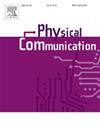Robust and secure transmission for RIS-assisted RSMA with transceiver hardware impairments
IF 2
4区 计算机科学
Q3 ENGINEERING, ELECTRICAL & ELECTRONIC
引用次数: 0
Abstract
In practice, transceiver hardware impairments inevitably introduce distortion noise, leading to a decrease in system security performance. In this paper, we present a robust and secure transmission framework for a rate-splitting multiple access (RSMA) communication system assisted by reconfigurable intelligent surface (RIS) with transceiver hardware impairments encountered in practice. Specifically, we investigate a joint optimization of transmitting precoder at base station (BS), phase shift at RIS, and allocation vector for common secrecy rate (SR), with objective of maximizing the minimum SR of the system. To address this issue, we firstly perform an equivalent transformation of the original problem, decoupling it into two distinct non-convex subproblems. Subsequently, we employ successive convex approximation (SCA) and semi-definite relaxation (SDR) to address the non-convexity of these subproblems, resulting in two convex approximate subproblems. Ultimately, we effectively solve these subproblems using alternating optimization (AO) method. Numerical results demonstrate that the proposed robust transmission scheme effectively mitigates the SR performance degradation induced by hardware impairments in comparison to traditional NOMA, SDMA, and non-robust schemes.
具有收发器硬件缺陷的ris辅助RSMA的鲁棒和安全传输
在实际应用中,收发器硬件的损坏不可避免地会引入失真噪声,从而导致系统安全性能的下降。在本文中,我们提出了一种鲁棒和安全的传输框架,用于在可重构智能表面(RIS)辅助下的分频多址(RSMA)通信系统,该系统具有实际中遇到的收发器硬件缺陷。具体而言,我们研究了基站发射预编码器(BS), RIS相移和共同保密率(SR)分配向量的联合优化,目标是最大化系统的最小SR。为了解决这个问题,我们首先对原始问题进行等价变换,将其解耦为两个不同的非凸子问题。随后,我们采用连续凸逼近(SCA)和半定松弛(SDR)来处理这些子问题的非凸性,得到两个凸近似子问题。最后,我们利用交替优化方法有效地求解了这些子问题。数值结果表明,与传统的NOMA、SDMA和非鲁棒传输方案相比,所提出的鲁棒传输方案有效地缓解了由硬件损伤引起的SR性能下降。
本文章由计算机程序翻译,如有差异,请以英文原文为准。
求助全文
约1分钟内获得全文
求助全文
来源期刊

Physical Communication
ENGINEERING, ELECTRICAL & ELECTRONICTELECO-TELECOMMUNICATIONS
CiteScore
5.00
自引率
9.10%
发文量
212
审稿时长
55 days
期刊介绍:
PHYCOM: Physical Communication is an international and archival journal providing complete coverage of all topics of interest to those involved in all aspects of physical layer communications. Theoretical research contributions presenting new techniques, concepts or analyses, applied contributions reporting on experiences and experiments, and tutorials are published.
Topics of interest include but are not limited to:
Physical layer issues of Wireless Local Area Networks, WiMAX, Wireless Mesh Networks, Sensor and Ad Hoc Networks, PCS Systems; Radio access protocols and algorithms for the physical layer; Spread Spectrum Communications; Channel Modeling; Detection and Estimation; Modulation and Coding; Multiplexing and Carrier Techniques; Broadband Wireless Communications; Wireless Personal Communications; Multi-user Detection; Signal Separation and Interference rejection: Multimedia Communications over Wireless; DSP Applications to Wireless Systems; Experimental and Prototype Results; Multiple Access Techniques; Space-time Processing; Synchronization Techniques; Error Control Techniques; Cryptography; Software Radios; Tracking; Resource Allocation and Inference Management; Multi-rate and Multi-carrier Communications; Cross layer Design and Optimization; Propagation and Channel Characterization; OFDM Systems; MIMO Systems; Ultra-Wideband Communications; Cognitive Radio System Architectures; Platforms and Hardware Implementations for the Support of Cognitive, Radio Systems; Cognitive Radio Resource Management and Dynamic Spectrum Sharing.
 求助内容:
求助内容: 应助结果提醒方式:
应助结果提醒方式:


